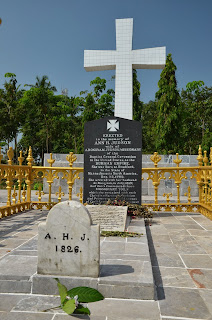It is also in Amherst that Ann is buried together with her young daughter Maria. Her original grave was beside the sea. With time and erosion, the sea was claiming that site, so her grave was moved to higher ground. However, the Burmese government claimed that second site for an national independence monument. So, once again Ann's grave was move. It now is on the property of the Amherst Baptist Church, a congregation founded by Adoniram Judson. Here a few photos of the Ann Judson grave site today.
 |
| Original Ann Judson headstone. |
 |
| Later memorial marker. |
 |
| Ann Judson grave site at Amherst today. |
After our trip to Amherst Baptist Church and Ann Judson's grave we return Moulmein, where we visited two congregation's founded by Adoniram Judson: Ebenezer Baptist Church and First Baptist Church. First Baptist's large sanctuary includes a memorial plaque to all of the American Baptist missionaries who have served in Moulmein. Included on the list are Cephas and Stella Bennett.
 |
| First Baptist Church secretary discusses missionaries listed on the congregation's memorial plaque. |
 |
| Close up of upper left corner of memorial plaque. Notice "C& S Bennet" (Sic) |
The Bennetts were sent out to Burma as American Baptist missionaries from the Second Baptist Church of Utica, New York in 1829. Years later when Second Baptist Church built a new church building at the corner of Hopper and King Streets it took the new name of Tabernacle Baptist Church. Tabernacle was only about a decade old when it sent the Bennetts to Burma as its missionaries. Cephas was a printer by trade and once in Burma helped print the first Burmese language Bible and later the scriptures in the Karen language.
He was a multi-talented man. He also began the first high school in Burma. The school still exists, but was nationally by the government in the 1960's. I learned today that Cephas Bennett also printed the first newspaper in Burma. And, during Adoniram Judson's long period of depression following the death of his beloved Ann, he stayed in the Bennett's home for a time.
It was a very humbling and sobering thing to stand at the grave of Ann Judson and before a plaque honoring Cephas and Stella Bennett, the first missionaries sent abroad by our congregation. These servants of Christ endured great suffering, heartache, and loss. They left behind them family, friends, and everything familiar to go half way around the world to live and minister in a distant, foreign land. Must others would have turned backed and abandoned the endeavor, but they persevered to plant the seeds of the Christian gospel in Burma.





































